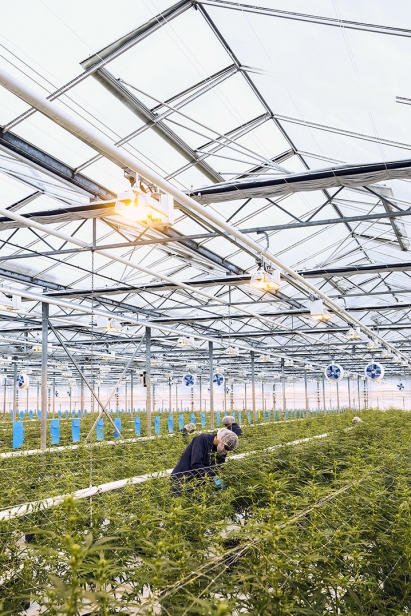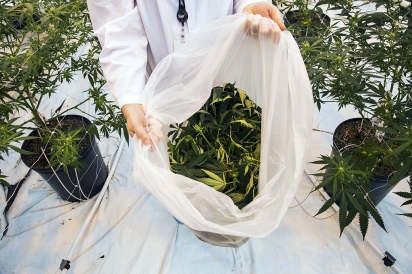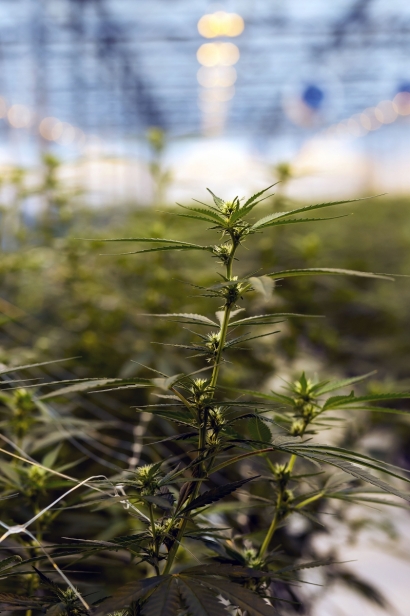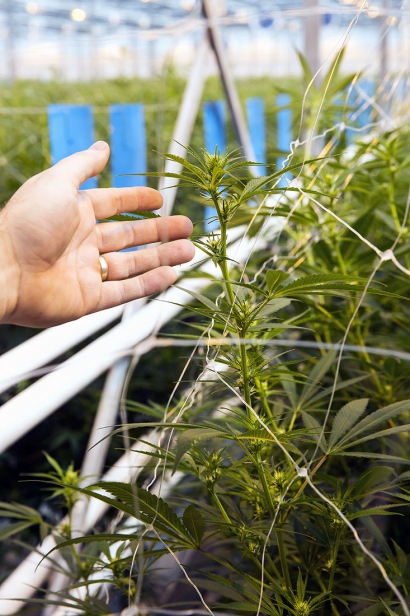Majoring in Mary Jane
There was a time when parents were concerned about their offspring going off to college and being exposed to marijuana. Now they’re majoring in it.
As the clock ticks down on the long-awaited legalization of recreational cannabis, which at the time of this printing is still promised by the end of the summer, everyone involved is scrambling to meet expected demand. This includes colleges and universities, which are educating students in industry-level cannabis growth.
“I would say we could be a factory for the highly qualified personnel the industry requires,” says Mike Dixon, professor at the University of Guelph’s School of Environmental Sciences. The school’s controlled environment systems department has done advanced research and design on medicinal marijuana for more than three years. And it’s proposing a ramped-up Cannabis Research Centre that would also offer expertise to recreational producers.
Meanwhile, Niagara College is working ahead of legalization day. This September, it will begin teaching the first 24 students in Canada’s debut post-secondary credential program in the production of commercial cannabis. With a new cohort each semester, that means there will be 72 new, young experts in marijuana harvesting within 18 months, each with jobs almost certainly waiting for them.
The expected main employer: Canopy Growth, the cannabis giant whose prime facility, Tweed Farms, sits right in Niagara College’s backyard in Niagara-on-the-Lake. Niagara College has already established a memorandum of understanding with Canopy Growth regarding internships and co-op programs.
As those who lived through generations of pot prohibition might say, “Heck, I learned to grow marijuana in college, too — I just didn’t get credit for it.” There is an element of irony in the fact that, back to the 1960s and 1970s, colleges and universities were where marijuana culture and its acceptance largely emerged.
But the stunning reality is that a multi-billion-dollar legal industry — with safety regulations, research and development and, most likely, a standardized rulebook — is being created almost overnight from a generations-old black market of illegal growing.
What makes cannabis farming different than lettuce or carrots is that lettuce and carrots aren’t illegal. So, for a century, agriculture programs such as the one at Niagara College have been free to research best-result farming practices for them. Meanwhile, no such research was carried out on marijuana (except clandestinely and criminally).
Even when it becomes legal, there will still be age restrictions — which is why Niagara College’s is a graduate program. No one under the age of 19 will be able to enroll. And you don’t have to be 19 to study carrots.
A year ago, there were about 30 licenced growers in Canada, servicing the medicinal marijuana industry and a clientele restricted by doctors’ prescriptions. Now there are more than 100, with the number rising by the week.
“We’ve been dealing with and talking about this a lot lately,” says Mark Zekulin, Canopy Growth president. “We’re dealing with three types of people: people with advanced university degrees in plant biology; there are people who have horticultural degrees and greenhouse experience; and there are people who’ve just grown a lot of weed in their basement,” he adds with a laugh. “We need all of them. They all have something to contribute.”
Levity aside, the growth of the industry is serious business. Canopy Growth operates seven cannabis production sites with more than a million square feet of production capacity each. And it’s expanding Tweed Farms to a million square feet as well.
“It’s exponential,” Zekulin says. “Niagara was a facility that, for the first four years of the Canadian [medicinal] system, was the largest cannabis facility in the world at 350,000 square feet.”
The paucity of scientific expertise in this overnight industry gives Dixon pause. His labs have come up with the first peer-reviewed scientific journals on cannabis production in North America. “We digest the plant and I can tell you what’s in it down to the molecule. One strain can be beneficial to epileptic seizures, for example and another strain not.”
When it comes to organic weed, which won’t be an option commercially out of the gate, Dixon says, “we do have an element of our program led by Tom Graham, who I dragged back from NASA where he researched plant growth in space and potentially, on Mars. He’s working on those aspects, disinfection protocols — that don’t leave toxic residues — that sort of thing.”
That may become important to consumers, given the hiccups with federally banned pesticides found at cannabis grow-ops that hit the news in 2017. One of the companies named was Mettrum, which had been bought by Canopy Growth. “We acquired the company and inherited the mess they had,” Zekulin says. “We quickly moved in systems to make sure it got back on track.”
But it speaks to the Wild West aspect of the production that once existed. “The waters are still kind of muddy in terms of the direction this whole [recreational] operation is going,” Dixon says. “The critical mass of people who know what they’re doing is very limited now.
“There’s some historical or heritage information from the last 50 or 60 years of — I guess we’ll call it what it is — illegal activity. But that has not been based in the context of scientific research and systematic investigations that arrive at the best possible options. A lot of it is based on anecdotal nonsense, quite frankly,” he adds.
In fact, one of Guelph’s controlled environment systems research facility’s recently published papers that debunked the efficacy of common growing practices, such as the cutting the tips of leaves.
Of course, you’re reading edible Toronto, and we’d be remiss if we left that aspect alone. The Canadian government is not okaying edibles and oils for the time being, even though items such as pot gummies and chocolates are on the market in legalized states such as Colorado, California and Washington.
But everyone expects that green light to come — including some celebrities. At the first O’Cannabiz Conference and Expo at Toronto’s Sheraton Centre in 2017, representatives for the San Francisco-based Whoopi & Maya edibles company (co-owned by Whoopi Goldberg and edibles entrepreneur Maya Elisabeth) gave a presentation. And rocker Melissa Etheridge, who owns the Etheridge Farms cannabis grow-op, was talking up her cannabis-infused wine.
“Given that the college does have a Canadian Food and Wine Institute and we have a food and beverage innovation centre, I could see that down the road,” says Vivian Kinnaird, Niagara College’s dean of business, hospitality and environment. “Of course, it would all be subject to federal laws and what becomes available for schools to work on, in collaboration with the industry.”
For Dixon, “edibles and oils are next on the [research anddevelopment] shopping list, because the application of the commodity is important. And probably the least popular way it will be consumed ultimately is by rolling it up and smoking it.”
Zekulin agrees with Dixon.
“I think he’s right. If you look just to Colorado or other U.S. states, dried flower sales remain surprisingly high, upwards of half the market, despite all the other things that are available,” the Canopy Growth president says.
“But for sure, there’s a certain view of smoking and the health consequences of that. And as you have exciting new products, whether they’re vape pens or chocolates, whatever, large parts of the market will gravitate toward that — as long as the products are good from a taste profile and an experience profile.
“As you move into oils and edibles, there’s more chance for the experience to not be good. It’s easier to take too much as opposed to using a vape pen or smoking a joint. Those products will come, for sure, but it’s incumbent on consumers and on us, as producers and retailers and the government, to know how much is too much.”
What everyone involved with cannabis research has discovered is that they are being taken more seriously these days.
“Three or four years ago, you’d get the knowing smile and that’s understandable” Dixon says. “This is a commodity and industry that’s been born of years of illegal activity. I suppose it’s akin in some respects to the re-evolution of alcohol after Prohibition. But that attitude was born of ignorance and it’s disappearing.”
As for the expertise-hungry industry, he says, “it will be what it is. I’ve participated in a number of workshops and panels and I know we’re not going to get it right immediately. There are too many variables. We will stumble a little bit coming out of the gate, it’s human nature.
“But the market will sort things out. If there is deemed to be a great deal of unreliability in a specific product from a specific producer, the market will weed out the poor performers and identify the stars.”
University of Guelph: School of Environmental Sciences
50 Stone Rd. E., Guelph, Ont.
uoguelph.ca | 519.824.4120
Niagara College: School of Environment and Horticulture
135 Taylor Rd., Niagara-on-the-Lake, Ont.
niagaracollege.ca | 905.735.2211
